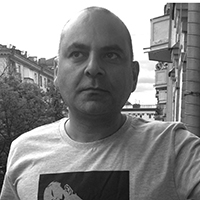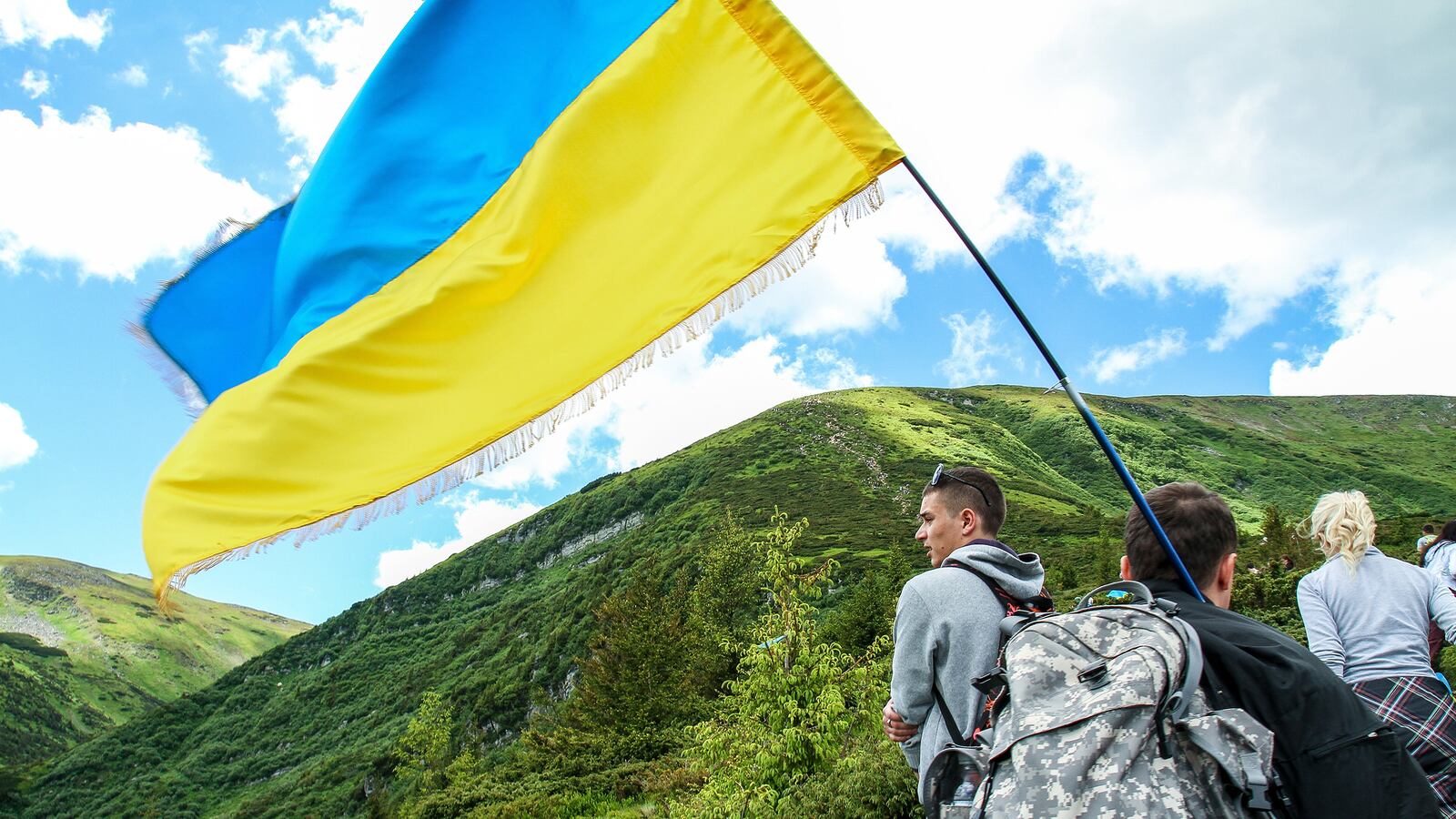The steep road up into the Carpathian mountains zigged and zagged past precipitous cliffs, but our driver was so animated that his hands repeatedly strayed from the wheel. “I was on the Maidan many times this year,” he declared proudly, making sure to lock into my eyes in the rearview mirror. “If it weren’t for common Ukrainians like us willing to fight unto the end, those bastards would still be in power.”
He gestured to the green valleys beyond, where he claimed that millions of cubic meters of Russian gas were stored underground in summer, so that the Russians could easily supply Europe in winter. “If Putin shuts off gas to Ukraine, we’re going to tap into those supplies. It’s Ukraine’s gas by right.”
The Carpathians peoples of Ukraine are known for their fierce pride and nationalism, fueled in part by their persecuted minority status in larger empires over the centuries. The Carpathians—once known as Ruthenia—were part of the Austro-Hungarian empire for over 300 years, before becoming part of Czechoslovakia after World War I. Briefly occupied by both Romania and Hungary in the inter-war period, they were only incorporated into the Soviet Union after World War II. This tortuous history of the Carpathian region has echoes in contemporary politics. When Putin acquired the Crimea, they were some hard-liners in Hungary who demanded that parts of the Carpathians be returned to Hungary.
This convoluted history, and history of persecution by larger nations, (the Ukrainian language was even actively suppressed during Czechoslovak rule) has forged a proud, strong peoples who are especially suspicious of aggressive empires, like Putin’s Russia.
Our driver for our weekend jaunt into the mountains was right out of central casting. His bald head, oversize features, and animated, bulging eyes gave him a Shrek-like appearance. We didn’t doubt that he could be fierce as an ogre when the need arose.
It was people like our driver who gave the muscle to this winter’s people’s revolution in Ukraine. When the government began to crack down in earnest in January, it was hard-core fighters from the Right Sector—many of whom hail from the Carpathians—that helped turn the tide. Their hero, Stepan Bandera, the leader of the OUN (Organisation of Ukrainian Nationalists) that bitterly fought the Soviets until the late ’50s, and who has been vilified by the Kremlin as a fascist, was born in a small town nestled against the mountains. There is now a museum to his honor in his birthplace of Staryi Uhryniv.
The Bandera museum wasn’t on my itinerary, however. I had come up to the mountains with my girlfriend to relax, and take a break from the constant drum roll of war that dominated the news in Kiev. In that, we quickly discovered that we weren’t alone. The train from Kiev to the picturesque base town of Ivano-Frankivsk was packed, and we had managed to snag the last free room at the hotel in the resort town of Yeramche. With most Ukrainians unwilling to holiday by the sea in Russian Crimea, the Carpathian mountains have emerged as an alternative summer destination.
“We used to go to the Crimea for two weeks every June,” said the couple sharing our train compartment. “Now we’re trying out the Carpathians. We’re not going to go to the Crimea as ‘foreigners.’”
Our lovely hotel perched on top a steep hill overlooking the mountains was also packed to the gills. “We’re booked solid until September,” gushed the receptionist at the hotel. “Everyone wants to be in the Carpathians now.”
The next morning we walked to the center of the local town, past pretty wooden houses with shingled roofs, sparkling mountain streams and peasant girls in dirndl skirts and flowered headgear. I had been to the Carpathians once before, over Christmas, but the rustic traditions of the locals, and lush verbiage of the unspoiled mountains in summer were captivating. Later, we hiked up a picturesque trail to the Dovbush rocks, which are a sort of local Stonehenge. Standing over the ancient rocks and surveying the vast panoramas of the surrounding mountains and valleys, the country felt peaceful and at one with nature. My girlfriend recited the first stanzas of a poem by Ukraine’s national poet, Taras Shevchenko.
“From the meadows to the Carpathian mountainswhere the sun beats from up high,to the slopes of the Dnieper,my dear lovely country is one”
Back at the hotel, though, dark clouds gathered. Our early-evening appointment with the sauna was canceled due to “technical reasons.” Leonid, the owner of the hotel, whom we had met in the restaurant the night before, was fuming.
“Gas prices have risen three times since the revolution, and electricity has doubled. How are we expected to run a business in these conditions?”
Leonid was a Russian from Moscow with a Ukrainian wife and three children, who had put his entire savings into building the hotel over three years ago.
“I’m downshifting by living up in the mountains,” he had confided over drinks the night before.
The war between Ukraine and Russia, however, and the anti-Russian rhetoric of the new government had rattled his nerves, and made him insecure about the future.
“Everything was stable under Yanukovych,” he complained. “Now I’m afraid that if I speak out against Poroshenko (the new president), some Maidan self-defense forces will come to the hotel and arrest me for treason. You’re either for the new government—or a traitor.”
His bear-like neighbor and close friend, a Carpathian native, who had been on the Maidan for many weeks, strongly disagreed with him. “Ukraine has triumphed,” he growled over drinks later. “We’ve kicked out the bad guys. Now there is real freedom. You shouldn’t worry so much.”
They argued late into the night that evening, with Leonid dissing the new government, while his friend banged the table, and defended the revolution and the new Ukraine.
When I went to bed around 3 a.m., they were still sparring over shots of home-brewed vodka.
As long as opposing sides in the new Ukraine can still argue over drinks—without coming to fists—this troubled nation has a chance to build a strong, new future.






